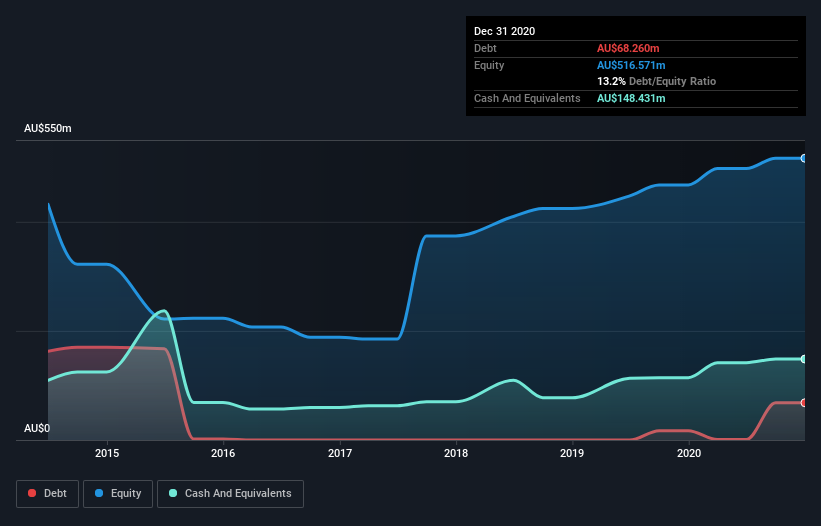Warren Buffett famously said, 'Volatility is far from synonymous with risk.' It's only natural to consider a company's balance sheet when you examine how risky it is, since debt is often involved when a business collapses. We note that Macmahon Holdings Limited (ASX:MAH) does have debt on its balance sheet. But the more important question is: how much risk is that debt creating?
What Risk Does Debt Bring?
Debt is a tool to help businesses grow, but if a business is incapable of paying off its lenders, then it exists at their mercy. Part and parcel of capitalism is the process of 'creative destruction' where failed businesses are mercilessly liquidated by their bankers. However, a more frequent (but still costly) occurrence is where a company must issue shares at bargain-basement prices, permanently diluting shareholders, just to shore up its balance sheet. Of course, the upside of debt is that it often represents cheap capital, especially when it replaces dilution in a company with the ability to reinvest at high rates of return. When we examine debt levels, we first consider both cash and debt levels, together.
Check out our latest analysis for Macmahon Holdings
What Is Macmahon Holdings's Net Debt?
The image below, which you can click on for greater detail, shows that at December 2020 Macmahon Holdings had debt of AU$68.3m, up from AU$17.1m in one year. However, it does have AU$148.4m in cash offsetting this, leading to net cash of AU$80.2m.

How Strong Is Macmahon Holdings' Balance Sheet?
The latest balance sheet data shows that Macmahon Holdings had liabilities of AU$269.4m due within a year, and liabilities of AU$216.4m falling due after that. Offsetting this, it had AU$148.4m in cash and AU$206.2m in receivables that were due within 12 months. So its liabilities outweigh the sum of its cash and (near-term) receivables by AU$131.1m.
While this might seem like a lot, it is not so bad since Macmahon Holdings has a market capitalization of AU$409.5m, and so it could probably strengthen its balance sheet by raising capital if it needed to. But we definitely want to keep our eyes open to indications that its debt is bringing too much risk. Despite its noteworthy liabilities, Macmahon Holdings boasts net cash, so it's fair to say it does not have a heavy debt load!
Another good sign is that Macmahon Holdings has been able to increase its EBIT by 22% in twelve months, making it easier to pay down debt. When analysing debt levels, the balance sheet is the obvious place to start. But it is future earnings, more than anything, that will determine Macmahon Holdings's ability to maintain a healthy balance sheet going forward. So if you want to see what the professionals think, you might find this free report on analyst profit forecasts to be interesting.
Finally, a business needs free cash flow to pay off debt; accounting profits just don't cut it. While Macmahon Holdings has net cash on its balance sheet, it's still worth taking a look at its ability to convert earnings before interest and tax (EBIT) to free cash flow, to help us understand how quickly it is building (or eroding) that cash balance. Over the last three years, Macmahon Holdings recorded free cash flow worth a fulsome 85% of its EBIT, which is stronger than we'd usually expect. That puts it in a very strong position to pay down debt.
Summing up
Although Macmahon Holdings's balance sheet isn't particularly strong, due to the total liabilities, it is clearly positive to see that it has net cash of AU$80.2m. The cherry on top was that in converted 85% of that EBIT to free cash flow, bringing in AU$48m. So is Macmahon Holdings's debt a risk? It doesn't seem so to us. There's no doubt that we learn most about debt from the balance sheet. However, not all investment risk resides within the balance sheet - far from it. For instance, we've identified 2 warning signs for Macmahon Holdings (1 is significant) you should be aware of.
When all is said and done, sometimes its easier to focus on companies that don't even need debt. Readers can access a list of growth stocks with zero net debt 100% free, right now.
When trading Macmahon Holdings or any other investment, use the platform considered by many to be the Professional's Gateway to the Worlds Market, Interactive Brokers. You get the lowest-cost* trading on stocks, options, futures, forex, bonds and funds worldwide from a single integrated account. Promoted
New: Manage All Your Stock Portfolios in One Place
We've created the ultimate portfolio companion for stock investors, and it's free.
• Connect an unlimited number of Portfolios and see your total in one currency
• Be alerted to new Warning Signs or Risks via email or mobile
• Track the Fair Value of your stocks
This article by Simply Wall St is general in nature. It does not constitute a recommendation to buy or sell any stock, and does not take account of your objectives, or your financial situation. We aim to bring you long-term focused analysis driven by fundamental data. Note that our analysis may not factor in the latest price-sensitive company announcements or qualitative material. Simply Wall St has no position in any stocks mentioned.
*Interactive Brokers Rated Lowest Cost Broker by StockBrokers.com Annual Online Review 2020
Have feedback on this article? Concerned about the content? Get in touch with us directly. Alternatively, email editorial-team (at) simplywallst.com.
About ASX:MAH
Macmahon Holdings
Provides surface mining, underground mining and mining support, and civil infrastructure services to mining companies in Australia and Southeast Asia.
Undervalued with excellent balance sheet.
Similar Companies
Market Insights
Community Narratives



